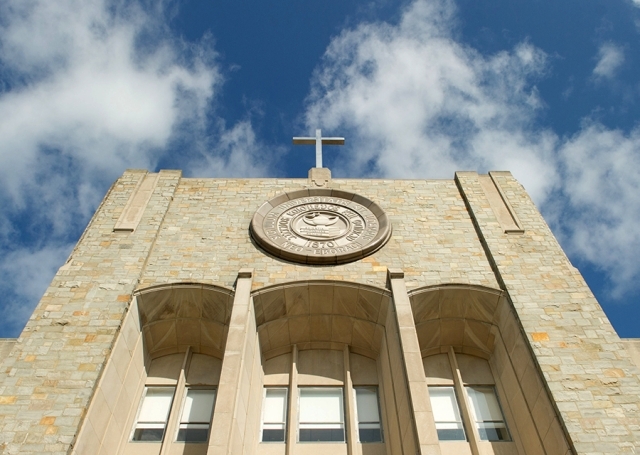

University Honors Program
- Home
- Academics
- Academic Resources and Programs
- University Honors Program
The University Honors Program features small classes, careful faculty mentoring, and an impressive number of academic and cultural opportunities. These range from performances at the Metropolitan Opera, the New York City Ballet, and the New York Philharmonic, to museum visits and Manhattan walking tours.
About the University Honors Program
The University Honors Program offers outstanding students the opportunity to maximize intellectual growth and experience personal enrichment. Students meet regularly with the program’s directors and faculty, creating a stimulating environment of thought, research and scholarly discourse.
It is possible for students taking senior seminars to complete a senior essay or major research project through honors independent study for which they would receive honors credit.
Please read on for in-depth descriptions of the University Honors Program's curriculum, faculty and activities – and to meet some of our current honors students.
See a recent feature on the UHP here: Honors Programs Help St. John’s Students Excel
Contact Us
University Honors Program
St. John's University
St. Augustine Hall
8000 Utopia Parkway
Queens, NY 11439
718-990-7554
[email protected]
Rachel Hollander, Ph.D.
Associate Professor of English
Director of the University Honors Program
(718) 390-4071
[email protected]
More Information
How are students chosen for the University Honors Program and what are the requirements for eligibility?
A: Incoming freshmen are considered for admission to the University Honors Program upon review of their application to the University. Upon acceptance to St. John’s University, eligible first-year students will be invited to complete a short application to be considered for the University Honors Program. Among the criteria used for selection are high school GPA, strength of high school courses, and the results of standardized tests, if submitted.
What options exist for students who do not meet the eligibility requirements?
A: On a limited basis, based on course availability and academic qualifications, some entering students may be granted an exception to join the University Honors Program. Students interested in being considered for an exception must contact the Honors Office prior to enrollment to obtain an exception request form.
Q: Can I become part of the Honors Program after my freshman year?
A: In order to have the best opportunity and flexibility to complete the University Honors Program, as well as to experience its other academic and social benefits, it is most advantageous to join at the beginning of the freshman year. Joining the program after the freshman year limits the ability to complete it. Therefore, these exceptions are rarely approved.
Q: Will I be required to take additional or different courses if I am part of the University Honors Program?
A: The University Honors Program requires the completion of 30 credits of honors-designated courses. The majority of this requirement is usually satisfied through completion of the University’s Core Curriculum; however, additional elective courses and other options to earn honors credit exist. Some options require pre-approval by the Honors Program administrators.
Q: What grade point average must I maintain to successfully complete the University Honors Program?
A: Students who are enrolled in the University Honors Program are expected to maintain an overall GPA of 3.3.
Q: Are there specific scholarships available to students in the University Honors Program?
A: As a result of their academic achievements in high school, students in the program are eligible to receive University- based merit scholarships. At the present time there are no additional scholarships awarded exclusively to honors students.
Q: How many students are enrolled in the University Honors Program and how many freshmen are admitted each fall?
A: There are approximately 1000 students in the University Honors Program and we enroll about 300 freshmen each fall.
Q: What is the size of honors courses?
A: Honors courses generally have no more than 25 students.
Q: What is the difference between honors courses and regular courses?
A: Honors courses are not necessarily more difficult. The professors may approach the class differently due to their smaller size and can often focus on topics in more depth. Discussion is an important aspect of honors courses.
Q: Can students in all majors complete the University Honors Program?
A: The program is open to incoming students who meet the eligibility requirements and are accepted into St. John’s College of Liberal Arts and Sciences, the Collins College of Professional Studies, the School of Education and Human Services, and The College of Pharmacy and Health Sciences.
Students in business majors who meet the eligibility requirements may participate in the Thomas J. Cox College Honors Program within the Tobin College of Business. Please contact Prof. Niall Hegarty, director of the program, at [email protected] or (718) 990-7402 for additional information.
Q: What are the benefits of being in the University Honors Program?
A: The program offers a number of academic and social benefits. Among them is the opportunity to be in small courses with students who share your academic profile. The program also offers a variety of events and activities and access to the Honors Commons, a lounge reserved for University Honors Program students. Students who complete 30 credits in honors courses will receive an honors certificate as well as special honors designation on their final transcript and diploma and recognition in the Commencement Booklet.
Q: Is there honors housing?
Yes. Students in the University Honors Program who choose to live on campus have an option to reside in an honors-designated section of Donovan Hall, the primary freshman residence hall.
To complete the University Honors Program, students take a minimum of 30 credit hours in honors courses (designated HON) or their equivalent. Students are expected to maintain an overall index of at least 3.3. University Honors Program courses are located primarily in the core curriculum, the courses all students at St. John's take.
Honors credit may be obtained in the following ways:
- A core curriculum “honors” (HON) designated course
- An “honors” designated elective
- A maximum of six credits may be applied as honors from either advanced placement credits in core corses, International Baccalaureate credits, or credits earned through the University's College Advantage Program.*
- Completion of a non-honors course within the major using an “Honors Contract” through which a student enrolls in a regular course, but makes a prior arrangement with the instructor and Honors Director to complete an additional project reflecting honors work.*
- A three-credit research experience, which can be a seminar or independent study course for independent study in the student’s field of concentration*
- Honors credits may be earned for study abroad in an online honors class.*
*These options are limited and require prior approval by the University Honors Program administrators and are limited in number as applicable to the Honors Certificate.
For more information about the University Honors Program, please contact the director.
Fall 2025 Honors Courses
| COURSE NAME | COURSE NUMBER | CRN | DAYS | TIMES |
|---|---|---|---|---|
| FIRST YEAR SEMINAR | FYS 1000H | 72730 | W | 1040-1330 |
| FIRST YEAR SEMINAR | FYS 1000H | 72731 | W | 1040-1330 |
| FIRST YEAR SEMINAR | FYS 1000H | 72732 | W | 1350-1640 |
| FIRST YEAR SEMINAR | FYS 1000H | 72733 | W | 1040- 1330 |
| FIRST YEAR SEMINAR | FYS 1000H | 72729 | W | 1040-1330 |
| PERSPECTIVES ON CHRISTIANITY | THE 1000H | 73232 | TF | 1040-1205 |
| PERSPECTIVES ON CHRISTIANITY | THE 1000H | 74465 | MR | 1525-1640 |
| PERSPECTIVES ON CHRISTIANITY | THE 1000H | 73230 | MR | 1040-1205 |
| THE MYSTERYOF GOD | THE 2200H | 74260 | TF | 1350-1515 |
| INTRODUCTION TO HINDUISM | THE 2830H | 75562 | MR | 1040-1205 |
| THEOLOGY OF PEACE | THE 3310H | 73233 | MR | 1040-1205 |
| MORAL THEOLOGY OF HEALTHCARE | THE 3300H | 75441 | TF | 1040-1205 |
| PHILOSOPHY – HUMAN PERSON | PHI 1000H | 72987 | MR | 0905-1030 |
| PHILOSOPHY – HUMAN PERSON | PHI 1000H | 72990 | TF | 0905-1030 |
| PHILOSOPHY – HUMAN PERSON | PHI 1000H | 72984 | TF | 1350-1515 |
| PHILOSOPHY – HUMAN PERSON | PHI 1000H | 72985 | TF | 1215-1340 |
| PHILOSOPHY – HUMAN PERSON | PHI 1000H | 72986 | ONLINE(asynch) | ONLINE |
| PHILOSOPHY – HUMAN PERSON | PHI 1000H | 72988 | MR | 1215-1340 |
| PHILOSOPHY -ETHICS | PHI 2200H | 73133 | MR | 1215- 1340 |
| ETHICS AND HEALTH CARE | PHI 2240H | 73063 | ONLINE(asynch) | ONLINE |
| ETHICS AND HEALTH CARE | PHI 2240H | 75449 | TF | 1215-1340 |
| PHILOSOPHY-METAPHYSICS | PHI 3000H | 74492 | ONLINE(asynch) | ONLINE |
| PHILOSOPHY- METAPHYSICS | PHI 3000H | 73135 | MR | 1215- 1340 |
| PHILOSOPHY-METAPHYSICS | PHI 3000H | 73136 | ONLINE(asynch) | ONLINE |
| PHILOSOPHY LOGIC | PHI 3400H | 73278 | MR | 0905- 1030 |
| PUBLIC SPEAKING | SPE 1000H | 72979 | MR | 0905-1030 |
| PUBLIC SPEAKING | SPE 1000H | 72980 | TF | 0905-1030 |
| PUBLIC SPEAKING | SPE 1000H | 72982 | MR | 1040-1205 |
| PUBLIC SPEAKING | SPE 1020H | 72983 | TF | 1525-1650 |
| PUBLIC SPEAKING | SPE 1000H | 72978 | TF | 1215-1340 |
| PUBLIC SPEAKING | SPE 1000H | 74560 | ONLINE(asynch) | ONLINE- |
| INTERPERSONAL COMMUNICATIONPHARMACY | CMC 1005H | 74550 | ONLINE(asynch) | ONLINE |
| SCIENTIFIC INQUIRY | SCI 1000H | 73388 | MR | 1040-1205 |
| SCIENTIFIC INQUIRY | SCI 1000H | 72831 | TF | 1215- 1340 |
| FUNDAMENTALS OF BIOLOGY I | BIO 1000H | 73300 | ONLINE(asynch) | ONLINE |
| FUNDAMENTALS OF BIOLOGY I | BIO 1000H | 73299 | MR | 1215-1340 |
| FUNDAMENTALS OF BIOLOGY II | BIO 2000H | 73302 | TF | 1525- 1650 |
| FUNDAMENTALS OF BIOLOGY II | BIO 2000H | 73301 | TF | 1700-1825 |
| FUNDAMENTALS OF BIOLOGY III | BIO 3000H | 74300 | MR | 1525-1650 |
| ADVANCED GENERAL CHEM I LECTURE | CHE 1310H | 73341 | MR | 1040-1205 |
| ADVANCED ORGANIC CHEM- LECTURE | CHE 2630H | 73290 | TF | 1040-1205 |
| FIRST YEAR WRITING | FYW 1000H | 72801 | T Hybrid | 1215-1340 |
| FIRST YEAR WRITING | FYW 1000H | 72797 | TF | 1525- 1650 |
| FIRST YEAR WRITING | FYW 1000H | 75348 | MR | 1525-1650 |
| FIRST YEAR WRITING | FYW 1000H | 72798 | R Hybrid | 1525-1650 |
| GLOBAL LITERATURE | ENG 1100H | 73094 | MR | 1215-1340 |
| GLOBAL LITERATURE | ENG 1100H | 74404 | MR | 0905-1030 |
| GLOBAL LITERATURE | ENG 1100H | 74349 | MR | 1040-1205 |
| GLOBAL LITERATURE | ENG 1100H | 73093 | TF | 1040-1205 |
| EMERGENCE OF GLOBAL SOCIETY | HIS 1000H | 73004 | MR | 1215-1340 |
| EMERGENCE OF GLOBAL SOCIETY | HIS 1000H | 75003 | TF | 1350-1515 |
| EMERGENCE OF GLOBAL SOCIETY | HIS 1000H | 75002 | TF | 1215-1340 |
| FRENCH LEVEL II | FRE 1020H | 73239 | MR | 1040-1205 |
| FRENCH LEVEL III | FRE 2030H | 73222 | MR | 1215-1340 |
| ITALIAN LEVEL III | ITA 2030H | 74388 | TF | 0905-1030 |
| ITALIAN INTERMEDIATE CONVERSATION | ITA 2040H | 74389 | TF | 1215-1340 |
| SPANISH LEVEL III | SPA 2030H | 74538 | TF | 1215-1340 |
| SPANISH INTERMEDIATE CONVERSATION | SPA 2040H | 74542 | T Hybrid | 1350-1515 |
| READINGS IN MODERN SPANISH | SPA 2050H | 73257 | T Hybrid | 1215-1340 |
| INTRODUCTORY PSYCHOLOGY | PSY 1000H | 73109 | MR | 1040-1205 |
| CHILD PSYCHOLOGY | PSY 2070H | 73116 | MR | 1040-1205 |
| ARGUMENTATION INQUIRY & ADVOCACY | CMC 2060H | 74371 | MR | 1525-1650 |
| THE CREATIVE PROCESS | ART 1000H | 72850 | TF | 1040-1205 |
| LANGUAGE & INTERCULTURAL COMMUNICATION | CMC 1155H | 74523 | T hybrid | 1215-1340 |
| POWER AND PERSUASION IN ART | ART 2140H | 75427 | ONLINE (asynch) | ONLINE |
| INEQUALITY: RACE, CLASS AND GENDER | SOC 1170H | 75389 | TF | 1040-1205 |
| LEGAL ARGUMENT | LES 1040H | 74277 | MR | 1525-1650 |
| CREATIVITY INNOVATION & ENTREPRENUERSHIP | ENT 1000H | 73288 | W | 1700-1950 |
| NEW VENTURE INITIATION | ENT 1003H | 74231 | ONLINE(asynch) | ONLINE |
University Honors Program Newsletter
The program's associate director sends emails weekly on program events. These include...
Manhattan Walking Tours visiting historic locations such as the Dutch and British city, the Lower East Side, the Upper West Side, and Central Park
Museum Gallery Tours including regular trips to the Metropolitan Museum of Art and the Cloisters, the Met's medieval collection in Washington Heights
Lecture Series
As schedules permit, the Honors Program invites a variety of speakers to address its students and the larger University community. Our previous speakers have included Oliver Sachs on psychology and music, Jill Lepore on race in pre-Revolutionary War New York, Barry Lewis on New York City neighborhoods, Joshua Foer on memory, Russell Shorto on Manhattan as the "Island at the Center of the World," and F.E. Peters on Islam and Christ.
Learning Community The University Honors Program is its own learning community. Residential students have the option of living in the Honors Wing of Donovan Hall, the freshman residence hall. Since Honors Program students take many of their classes together, study groups naturally follow, and these are available to commuting students as well. Lunches, holiday snack days, a student-faculty softball game, film series, and even a quidditch tournament now and then are parts of the program.
Music/Dance Series
NewYork City Ballet performances and its Balanchine production of Tchaikovsky's The Nutcracker have become anticipated regular events of the University Honors Program. Performances of the Metropolitan Opera and concerts of the New York Philharmonic as well, all of these offered free every semester to the extent our budget allows, are exceptionally popular parts of the program.
Honors Faculty
Below is a sampling of some of our most distinguished faculty members.
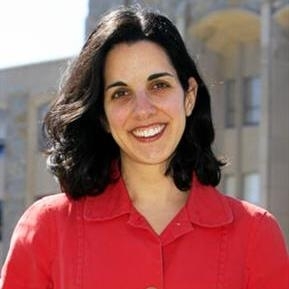
Dohra Ahmad loves teaching at St. John’s University, which she has been doing since 2004. She received her Ph. D. from Columbia University that year and previously attended Yale University (B.A.) and Hunter College High School. At St. John’s she teaches undergraduate and graduate courses in twentieth-century postcolonial and world Anglophone literature, postcolonial theory, American and ethnic American literature, and utopian fiction. Dr. Ahmad also serves as an advisor for faculty members who teach English 1100C (Literature in a Global Context) as well as frequently teaching the course herself.
Her research aims to draw thematic, stylistic, and historical connections among various twentieth-century literary movements. She is the author of Landscapes of Hope: Anti-Colonial Utopianism in the United States (Oxford University Press, 2009) and editor of Rotten English: A Literary Anthology (W. W. Norton, 2007). Her essays have appeared in ELH, the Yale Journal of Criticism, Social Text, and the Journal of Commonwealth Literature. She has given invited lectures on postcolonial literature, vernacular literature, and pedagogy at New York University, the University of Pittsburgh, and CUNY. In her spare time she likes to lounge around, do arts and crafts projects with her two daughters, and volunteer at P.S. 261 in Brooklyn.
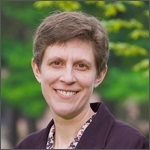
Just about anyone who has been fortunate enough to have been a student in one of her classes knows what a privilege it is to study with Dr. Alison Hyslop, Professor, Department of Chemistry and a regular faculty member of the Honors Program. Indeed, the immediate response one has to first meeting Dr. Hyslop is an unusual mixture of enthusiasm for her discipline coupled with a quick, brilliant mind, and even more an inherent kindness that makes the intimidating discipline of chemistry clear and accessible.
Dr. Hyslop describes one of the teaching techniques she regularly employs in general chemistry. She gives beginning students an unidentified compound and requires them to identify it by its chemical and physical properties, then to synthesize it. She carefully organizes her students into groups and invariably, she notes, the fears and barriers begin to fall. One student takes the initiative and at first others follow until another comes forward with another procedure to allow the team to reach an empirical conclusion.
It is typical of Dr. Hyslop that when asked about herself she describes her experience with students. She so clearly identifies with them that they are inseparable from the way she views herself. Dr. Hyslop does not mention until specifically asked that she obtained her doctorate in chemistry from the University of Pennsylvania, that she has taught all levels of chemistry during her decade and a half at St. John’s, or that her research interests have focused on the design, synthesis, and study of light-harvesting complexes based on porphyrins, essentially how they convert light into usable forms of energy. Dr. Hyslop is, in every sense, a treasured asset of the program.
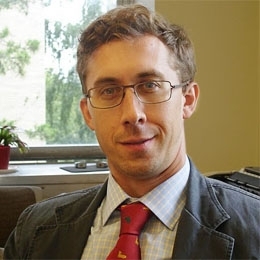
Professor Milford is an historian of colonial and early national North America. He studied at Duke and Harvard universities. His research has concentrated on political change and cultural aspiration in the late 18th century. For an example of his work, see The Gardiners of Massachusetts: Provincial Ambition and the British-American Career (University Press of New England, 2005). He is currently studying how Latin American unrest and the geopolitics of the Napoleonic era affected Anglo-American relations and conceptions of empire.
Prof. Milford teaches an honors section of the history core every year – and sometimes twice a year. He also offers courses on colonial and revolutionary America, the law and its practice in American history, and the confrontation of Europeans and Amerindians. He advises the St. John’s chapter of Phi Alpha Theta, the national history honor society.
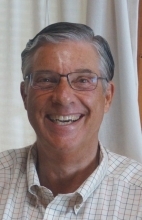
Paul D. Molnar, Ph.D. in Contemporary Systematic Theology from Fordham University (1980), is Professor of Systematic or Dogmatic Theology in the Department of Theology and Religious Studies at St. John’s. After teaching for two years as a Visiting Professor at St. Joseph’s University, Philadelphia, Dr. Molnar began his full-time teaching career at St. John’s in 1985. His special areas of study include Trinitarian doctrine (the doctrine of God), the doctrine of revelation, Christology (the study of the person and work of Jesus), theological method and the theology of Karl Barth and Thomas F. Torrance. He has published six books and well over 1,000 pages in the world’s leading journals and has lectured in Scotland at the Universities of Edinburgh, St. Andrews and Aberdeen on a number of occasions over the last twenty-five years. In 2009, he was invited to teach a graduate course in the doctrine of the Trinity at Laidlaw Carey Graduate school in Auckland, New Zealand and gave a public lecture as well as a lecture to graduate students at the University of Otago in Dunedin, New Zealand.
Dr. Molnar has been teaching in the Honors Program for many years and very much enjoys working with our honors students. He has taught both the introductory course and the course in Christology. These courses engage students from all religious backgrounds in the important questions that ancient and contemporary theologians grapple with in connection with the practical implications of the Christian faith. As one modern theologian once put it, everything looks different in light of the doctrine of the Trinity.
In Dr. Molnar’s experience, honors students love to assess critically the views of various theologians who claim to be presenting the truth of the Christian faith, but often contradict their own stated intentions. Such theologians allow personal agendas rather than the object of Christian faith to shape what they say about God and our relations with God.
Dr. Molnar particularly enjoys working closely with his students to enhance their writing skills. He encourages them to think for themselves in a scientific way by allowing the object that they are reflecting on to shape the truth of what they think and say. He endeavors to provide more than a set of doctrinaire assertions and asks his students to think about the problems that theologians have faced in connection with the Old and New Testament witness as reflected in Church teaching over the centuries and in connection with contemporary reflection on that witness.
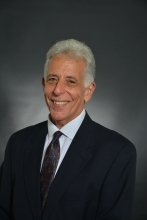
Lawrence Pitilli teaches because, as he states, it is a great opportunity to “work with my brains and my soul.” An alumnus of St. John’s University and tenured associate professor of speech, he has been teaching in the English and Speech Department of the College of Professional Studies since 1986. In addition to honors, core, and advanced public speaking courses, Professor Pitilli also teaches honors and core Discover New York and Liberal Studies. Prior to joining the CPS faculty, he taught language arts in special education.
His research is in popular culture with a focus on music. His book Doo-Wop Acappella: A Story of Street Corners, Echoes, and Three-Part Harmonies, published by Rowman &Littlefield, is the first serious treatment of this very specific musical genre. He has also published chapters and essays in other edited books and publications including Rock Music Studies. Additionally, he has consistently presented papers at both regional and national popular culture conferences.
Professor Pitilli also has a professional musical background as a composer, lyricist, singer, and multi-instrumentalist. He is a two-time recipient of the ASCAP Musical Theatre Popular Award and the Grand Prize Winner of the Nashville Songwriting Competition. He currently sings backup vocals and plays keyboards for the SJU-based GP Orchestras, a doo-wop and R&B group whose proceeds help fund our Military Veterans Center on campus. Professor Pitilli holds St. John’s deep in his heart and regards our community as his home away from home. If he has one more quote to offer on teaching it just might be the following: “you don’t teach because you want to, you teach because it’s a need – a need to make that connection with your class.”
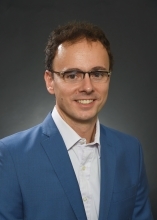
Dr. Matteo Ruggiu earned his bachelor’s degree in biology at the University of Pavia, Italy, and his Ph.D. at the Medical Research Council, Human Genetics Unit, in Edinburgh, Scotland, UK. After postdoctoral work at Rockefeller University and Columbia University, Dr. Ruggiu joined St. John’s University as an assistant professor in 2013. He became associate professor with tenure in 2018.
Dr. Ruggiu has been teaching the honors courses in biology since 2015, BIO 2000 and BIO 3000, one each semester. He also teaches graduate courses in biology.
In addition to his teaching, Dr. Ruggiu has a genuine passion for research. His laboratory at St. John’s studies the molecular biology of protein-RNA networks that control gene expression in the brain, and how they relate to the basic biology of neurons and to diseases of the nervous system, particularly neurodegeneration. Dr. Ruggiu works with both graduate and undergraduate students in his lab, and finds his Honors Program students some of his most promising researchers. Dr. Ruggiu also brings his direct research experience in the classroom, often integrating his lectures with recently published breakthrough scientific discoveries. Dr. Ruggiu has published more than twenty research articles, and his research is funded by a grant from the National Institutes of Health. In 2018, Dr. Ruggiu received both the Research Recognition Award and the Faculty Recognition Award from St. John’s.
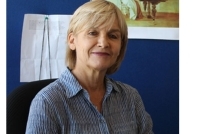
Heidi Upton is an Associate Professor at St. John’s University in Queens, New York, where she has taught since the fall of 2003. A fulltime professor for Discover New York, a core-curriculum freshman transition course, she is also affiliated with the Department of Art and Design where she teaches other core curriculum courses including Introduction to Music, Music Theory, and The Creative Process. She is Faculty Advisor for St. John’s Chamber Music Society, a student group dedicated to the performance of collaborative music. Dr. Upton has published several works focusing on her research topic: aesthetic education and civic engagement.
Dr. Upton has been a teaching artist for Lincoln Center Institute for the Arts in Education (LCE) since 1998. She is distinguished as being one of its first full-time teaching artists, a post she was awarded in 2001. She has also participated in writing several special projects for LCE, resulting in publications such as Windows on the Work (resource manuals that accompany the Institute’s Repertory) and the Lincoln Center Institute/Time Warner, Inc. Professional Development Discussions: Aesthetic Education and Youth Programs: A Guide to Best Practices. She has been heard on National Public Radio as a pianist and commentator and on Public Radio International as an announcer. In addition, she can be heard as the narrator of several documentaries.
Dr. Upton, a pianist, was awarded the Doctor of Musical Arts degree from Manhattan School of Music. She received the Master of Music and Bachelor of Music degrees from The Juilliard School, as a scholarship student of Sascha Gorodnitzki. She has performed as soloist with orchestras such as the St. Louis Symphony, the Kansas City Symphony and the Juilliard Orchestra, under such music directors as Leonard Slatkin, John Nelson, William McGlaughlin, and Christopher Kendall. Ms. Upton has appeared in recital and chamber music with many artists in such venues as Caramoor Center for the Arts and on Martha’s Vineyard. She has performed extensively the music of composer and conductor David Amram with whom she has appeared at the Cathedral of St. John the Divine, the Jewish Museum and on national radio broadcasts. As a member of Cicada Chamber Players, she can be heard on Listening for Blossoms, the recently released recording of the music of composer Lei Liang. A native New Yorker, Dr. Upton is a graduate of the famed High School of Performing Arts.
Meet Our Honors Students
All of the students profiled below are presently completing their core requirements (those courses all undergraduates at St. John's take) in special honors sections of these courses even as they pursue a wide variety of majors in the college or school appropriate to that major.
The abbreviations that follow the names of the students profiled below stand for St. John's College of Liberal Arts and Sciences, the College of Pharmacy and Health Sciences, the School of Education, and the Collins College of Professional Studies.
These young people differ considerably from one another, yet all of them love learning. The University Honors Program, as they themselves are first to say, unites them and broadens their educational experience.
We are very proud of them, and believe that you will be as impressed by their ambition and achievements as we are.
Kayleisha Adrien had heard about the unique and life-changing experiences her father had had while he was a student at St. John’s University. It is no wonder, then, that Kayleisha felt as though she knew St. John’s before she even saw the campus. Once she had arrived, she was certain it would be the perfect place for her.
Born and raised in Georgia, Kayleisha subsequently moved with her family to South Florida and graduated from high school there with honors. High school developed her love of medical science, and this led Kayleisha to volunteer at local hospitals and compete in science-related fairs.
Her hospital and science involvements provided firsthand exposure to the serious mental struggles others face. Consequently, Kayleisha developed a research interest in the brain and its behavioral and cognitive abilities.
Kayleisha’s interests are catholic and go far beyond science. She appreciates fine art and loves to paint; she plays the violin and loves to explore Manhattan with friends and on her own. She also enjoys languages and discovering unfamiliar cultures and looks forward to participating in one of the University’s study-abroad programs.
Kayleisha presently is working on her psychology degree while pursuing a pre-med track. Through the University Honors Program, she has access to small classes filled with students as eager to learn as herself as well as access to undergraduate research experience. The program has made Kayleisha feel part of a learning community that supports her as she continues her academic journey.

Born and raised in New Jersey, Lara Albrechcinski attended the Wardlaw-Hartridge School, a small private school located in Edison, from Pre-K to 12th grade. In choosing a college, Lara was looking for the same strong sense of community and diversity that her school had, and she found it at St. John’s. She has now experienced what a “perfect fit” feels like and is incredibly grateful for the opportunities that present themselves here. She loves the atmosphere of New York City and plans to expand her horizons even more by studying abroad and visiting Italy, France, and Spain through the Discover the World program.
Lara has wanted to be a pharmacist ever since she was little; she was always interested in science and medicine. She was vice-president of the STEM Society in her high school and would help run the annual Science Fair. Lara enjoys her time learning about pharmacy related topics and focuses on her studies in hope that she will be accepted into the Rho Chi Society, the international Honors Society for pharmaceutical sciences, when she is eligible.
In high school, Lara found a passion for volleyball and became the captain of her team two years in a row. Now when she is free from her studies, Lara can be seen participating in intramural volleyball and in the other workout classes that St. John’s has to offer, especially Blacklight Spin and Bootcamp class. Lara appreciates the Vincentian mission of St. John’s and enjoys volunteering to help out the community. She finds solace in participating in New York Cares Day, Midnight Runs, and Academic Service Learning around St. John’s University.
Lara The Honors Program has allowed Lara to try activities that she otherwise would not have, as well as learn a great deal about things she had never been exposed to before. Thanks to the Honors Program Lara has a newfound love for the Metropolitan Opera and the New York Philharmonic. She recently saw her first opera, Carmen, and plans to attend many more. She also appreciates the smaller size of honors classes and the Honors Commons, where students can be found quietly studying, enjoying each other’s company, and enjoying special snack days, all of which remind her of her honors high school community at home. Thanks to the Honors Program, Lara knows she will excel and grow not only academically, but culturally and experientially.

Eryn Banton is a sophomore majoring in Global Sustainability and Development in St. John’s College. She was born and raised in a suburb of Philadelphia, where she attended Cheltenham High School. Eryn was attracted to St. John’s because of the unique level of diversity among its staff and students, along with the many amazing study abroad opportunities that the school has to offer.
In high school, Eryn was in Black Student Union, Environmental Club, Black Scholars, and was a diversity leader for the freshman class. She was the captain of the tennis team and played as the #1 player for all three years that she attended Cheltenham, while also competing at the regional level in the USTA tennis league. The highlight of Eryn’s high school career was the Anti-Gun Violence/ Police Brutality rally she organized, known as See Our Faces, Hear Our Voices. She led over 200 students to protest in downtown Philadelphia, where they held a rally that focused on giving minority communities an opportunity to speak out against poor media representation as well as speaking out about the lack of action taken by the government when it comes to making change in those communities.
At St. John’s, Eryn works as a Common Ground Facilitator that deals with leading conversations around race, socioeconomic issues, gender, and more. She is also involved in the Sustainability Club, NAACP, Haryah, and LASO.
Eryn loves the Honors Program because it challenges her. The students in her classes all share a drive to overachieve and succeed. The program also gives her the opportunity to see many amazing places in New York. One of her favorite parts of being in the Honors Program was having Dr. Forman as a professor. She felt that it was incredibly reassuring to see how invested the director of the Honors Program is in the wellbeing of his students in and out of the classroom.
 Even with the abundance of universities in the Boston area, Nicholas Ciccolo, a native of Weymouth, Massachusetts, has always been drawn to New York City. After visiting St. John’s and having learned of its criminal justice program, it was clear which school he would attend.
Even with the abundance of universities in the Boston area, Nicholas Ciccolo, a native of Weymouth, Massachusetts, has always been drawn to New York City. After visiting St. John’s and having learned of its criminal justice program, it was clear which school he would attend.
Nicholas enjoys overcoming obstacles and sees every challenge as an opportunity to succeed. This is the reason he accepted the invitation to join the University Honors Program. Nicholas says it has become one of his most gratifying experiences at St John’s. The opportunity to share a classroom with St. John’s brightest undergraduates has exposed Nicholas to perspectives he otherwise might not have considered and has allowed him to become friends with students of differing backgrounds from across the University.
Nicholas has always wanted to work in federal law enforcement, and studying with professors who have had real-world experience at some of the world’s most important law enforcement agencies has been a formative experience for him. Consequently, Nicholas has become a criminal justice major in the B.S./M.P.S. combined Criminal Justice / Homeland Security Program. His immediate academic goals are to take his bachelor’s degree in 2024 and his master's in 2025.
Nicholas sees his membership in the Catholic Scholars Program and the St. Vincent DePaul Society as another important component of his education. These organizations have provided him with unique experiences helping others in the community and a community of his own on campus while he is away from home. Through the University Honors Program, Nicholas has expanded his education and is excited for what his next years will bring.

Jack Jacobi enrolled at St. John’s University before ever having set foot in the state of New York. As Jack was growing up in Oklahoma City, Oklahoma, his parents always went to lengths to ensure that he was cultured beyond the borders of his home state on the plains. This included taking piano lessons, regular trips to local museums, and accompanying his mother and grandmother to plays and musicals.
When choosing which college to enroll at, St. John’s became the clear choice because of its diversity, location, and all the added benefits that come with going to school in perhaps the most culturally diverse city in the world (as well as the most diverse borough within that city). He chose to major in Global Development & Sustainability because it parlayed his lifelong interest in history and geopolitical relations into a dynamic area of study given the persistent globalization and increased interconnectivity of all communities around the world. Spanish was a natural choice for a second major because of the required language courses within the GDS program and the opportunity to further his studies of the language and cultures of the Spanish-speaking world that had already begun in high school where he was the president of the Spanish Club.
At St. John’s, Jack has been able to continue his long-established habit of visiting museums and attending musicals, operas, symphonies, and plays through the Honors Program. This has come in the form of group outings to Lincoln Center, the Metropolitan Museum of Art, and walking tours around Manhattan led by Dr. Forman. Outside of the Honors Program, he enjoys captaining an intramural soccer team, partakes in events put on by Sigma Delta Pi (the National Hispanic Honor Society), is a skull of the St. John’s College Skull and Circle Honor Society, and is an active member of St. John’s UNICEF Club.
Upon graduation, he would like to serve in the Peace Corps for two years. He arrived at this decision due to his need to serve others, his love of travel as well as different perspectives, and the desire to immerse himself in a Spanish-speaking country. Upon completion of his service with the Peace Corps, he has aspirations of one day working for an organization that is dedicated to climate action because of the clear and present threat that it presents to everyone on the planet as well as the natural environments of which he has grown so fond. This applies especially to Colorado, the home of his extended family and setting for countless ski trips, hikes, and river floats.

Metka Kunstelj is an international student from Slovenia, who as a young child lived in Canada and in her teenage years in Italy. In high school, she discovered various mundane applications of chemistry, such as perfumery, cosmetics, and food production. While still in high school, Metka deepened her love for serving people through various outreach and service-based clubs. This combination of interests and influences led her to major in chemistry at St. John’s.
The University Honors Program has continuously enhanced Metka’s experience at St. John’s. One of its advantages is smaller classes, allowing her to gain a deeper knowledge of the material and develop stronger relationships with her professors and peers. This has provided an opportunity to choose from a wider variety of courses, all of which have covered topics she otherwise might never have in regular sections of a comparable course.
Metka is also a Catholic Scholar, a program through which she has developed her faith as well as her leadership skills. This has taught her meaningful ways to become a mentor to others to help them grow in their own faith and understand themselves.
As an international student, it is important for Metka to connect with other international students going through similar challenges of living in a foreign country. She has done so through Project AIM, first as a mentee and then mentor, where students come together to help each other make SJU and New York their home. In her freshman year, Metka focused on experiencing the various sides of SJU: attending and supporting the soccer and basketball teams, participating in a Chappel Players Theatre play in the Little Theatre, and becoming a member of the St. Vincent De Paul Society.

Born and raised in Queens, New York, Amelia Lam had always taken a considerable interest in serving her community. This made St. John's an easy choice when looking for a university that not only fit her academic needs but also aligned with her personal values.
In high school, Amelia became interested in the sciences and chose electives such as microbiology writing research articles for her school's science journal. This led her to major in biology and minor in chemistry at St. John's.
The University Honors Program has played a significant role during Amelia's years at St. John's, allowing her to take select courses and participate in the program’s activities. These honors courses have affected how she sees the world. Her honors chemistry emphasis on presentation has taught her to effectively communicate what she learned and how to apply it to life around her. Honors Ethics in Healthcare has provided varied perspectives in medicine, inclining her to scrutinize a physician's role in healthcare and the power those who work in the healthcare professions have to advocate for their patients.
Courses like these have shaped how she wants to pursue her future goals of becoming a doctor and what type of physician she wants to be. The UHP has also allowed her to explore subjects outside the sciences through select honors art courses. These have provided her access to local museums and concerts within New York City and a rounded academic experience at St. John's.
Amelia's extracurricular activities at St. John's include serving as President of Omega Phi Theta (Pre-Medical Academic Fraternity at SJU), being a Skull and Circle Honor Society member, and participating in microbiology research in the Juarez Lab on campus. In addition, she is also an EPIC Mentor offering guidance to underclassmen.
Amelia also has continued volunteer work at her local hospital, food pantry, and a New York City-based non-profit organization that works directly with tutoring children to bridge the education gap. She also assists in the New York University psychology program that focuses on behavioral science and the ways in which people's motivations and perceptions allow them to reach their goals.
The UHP has given Amelia invaluable skills that she will carry with her as she finishes her undergraduate career at St. John's and for the rest of her life. She has learned to pursue her passions and open her horizons to new interests.
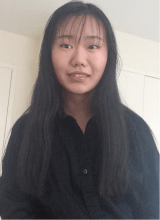
Julie Liu, a holder of the Provost and Stem Scholars Scholarships, is a chemistry major born and raised in Dallas, Texas.
When she was only eleven, she visited China with her parents, themselves immigrants. Even then, Julie noticed the difference in standards of living, degrees of wealth, and even the physical environment. She wondered even at that time how to lessen or eliminate these problems.
In high school, Julie gained interest in chemistry and noted how chemical interactions can be destructive or beneficial. Noting the enormous number of chemicals found in everyday toiletries and cosmetics, she experimented with natural ingredients and formulated some basic products of her own.
At St. John’s, Julie has pursued these environmental and personal applications of chemistry, and has become especially interested in how the world manages its waste and cleanses its air. Her ultimate goal is to enter industry and pursue research in these areas.
Julie plays the violin, and has studied the instrument since childhood. Her favorite composers are Tchaikovsky and Paganini. The mathematics of their music especially appeals to her. Presently, she is considering entering the combined degree bachelor’s degree and master’s degree program in chemistry at St. John’s. For now, however, Julie is a mainstay of the University Honors Program. We are delighted to have her with us.
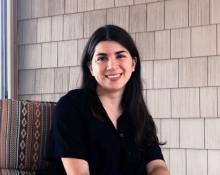
As salutatorian of Massapequa High School on Long Island, Alexa always had St. John’s University in her sights when searching for a college that met her academic needs and provided opportunities for her future career. Alexa knew she did not want to move too far from home for college. At the same time, because she had grown up so close to New York City, she felt drawn to all that the city had to offer. There were plenty of New York City universities to choose from, but St. John’s perfectly met Alexa’s needs because of its proximity to both home to and Manhattan, as well as for its diverse campus, extensive academic resources, courses in her fields of interest, and connections to career gateway opportunities. She was also drawn to St. John’s vast study abroad options and opportunities.
During her first semester at St. John’s as a journalism major, Alexa came to realize that she wanted to pursue a different academic path. Her freshman advisor and other St. John’s staff helped make her transition swift and easy. Alexa is presently an anthropology major with a minor in classics. Each semester she is excited to start her new classes in a field of study she finds wholly engaging and instructive to her future career path.
Although Covid-19 regulations meant that certain activities and opportunities were limited on campus, the University Honors Program was able to adapt its programs in a way that kept students involved and attentive. Alexa frequently enjoyed Honors Program director Dr. Forman’s presentations on New York history, artworks at the Metropolitan Museum of Art, and operas that took the place of his usual museum and city walking tours. Even classes such as Alexa’s Discover New York: Immigration course, which usually implemented trips throughout the city to enhance the class experience, were able to adapt to restrictions to keep the class engaging and multidimensional.
One of Alexa’s favorite classes was Honors Perspectives on Christianity, which was fully asynchronous. Her professor, Dr. Kidd, took the potentially dull format of an asynchronous class and implemented multimedia lessons and ways for students to participate that kept the students just as engaged as if they were in a traditional classroom. Overall, despite the limitations put on campus activity, Alexa still felt connected to her peers and professors.
As Alexa enters her sophomore year and as the world slowly reopens, she excitedly anticipates more campus activities to be available, Honors activities most of all. Her time at St. John’s is only beginning, and she is excited to see where it takes her.
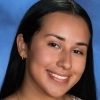 Mariajose Moreno-Mahecha always knew that she would attend university in diverse, dynamic New York City. This is the reason she chose St. John’s. Her hometown is Baldwin, Long Island, itself diverse and suburban, and she wanted to continue her education in a comparable urban environment.
Mariajose Moreno-Mahecha always knew that she would attend university in diverse, dynamic New York City. This is the reason she chose St. John’s. Her hometown is Baldwin, Long Island, itself diverse and suburban, and she wanted to continue her education in a comparable urban environment.
Mariajose loves St. John’s for many reasons, one being the differing backgrounds and interests of its students and faculty. Another is St. John’s Queens campus location, only a half-hour by subway from Manhattan.
Our handsome Queens campus is just close enough to Baldwin to allow Mariajose to return home when she wishes, yet remain in the Residential Village with her friends, form study groups with her classmates, and enjoy the Great Lawn on sunny days.
Mariajose also loves SJU’s many study-abroad programs, specifically the Global Passport and Discover Italy. At the end of her first year, she studied in Rome through the Global Passport program. Spending time in the Eternal City has her counting the days until she can return.
In fact, if things go as Mariajose wishes, she will be spending next spring semester in Rome with the School of Education teaching Italian children and acquiring practical teaching experience that complements her major. She is presently pursuing her B.S. degree in Childhood Education and hopes to enroll in the five-year B.S./M.S. degree program, then acquire an extension certificate in bilingual English/Spanish education.
Based on her excellent first-year grades, Mariajose is on track to join Kappa Delta Pi, the International Honor Society in Education, as well as the John Dewey Society.
The University Honors Program has provided Mariajose several new goals, many memories, a few challenges, and a wealth of benefits. This past spring, for example, Mariajose took Honors Global Literature with Dr. Forman. She loved the course since it was so different from her previous literature classes. As part of the course, she studied an opera, Mozart’s Die Zauberflöte (The Magic Flute). She loved analyzing every character and connecting the opera to the class objective: that the arts have no beginning, middle, or end, are timeless, and can be seen as various triangulations as they interact with one another across time.
Mariajose also loves to attend UHP events, whether watching a movie in the Honors Commons with her friends, getting a quick holiday snack, or going on a city trip with her fellow students. She has met her best friends through these events and has made countless memories.

Growing up in southern New Jersey, New York City was always close enough to be an almost reachable dream for Eleanor Myers. She entered St. John’s as an English major and Presidential Scholar, and the Honors Program has made it possible for her to experience that dream in ways that she hadn’t anticipated. In fact, cultural trips that the Honors Program sponsors and sites found through her Discover New York class have made Eleanor a Manhattan regular. Eleanor writes poetry and loves all facets of creativity, so the tours of the Metropolitan Museum of Art guided by the Honors Program director, Dr. Forman, have been some of her most enjoyable extracurricular experiences in the program.
Eleanor’s Honors Discover New York class gave her the opportunity to present her original poetry and historical research for her fellow students and faculty as part of University Research Day, winning the Freshman University Research Award. Under guidance from Professor Albert, Eleanor found new avenues through which she could explore both the city and her love for literature and poetry. Another honors class that has been a favorite of Eleanor’s so far is Perspectives of Christianity with Professor Kidd, and she also enjoyed taking a classics-based literature class with Dr. Forman.
In addition to the Honors Program, Eleanor is a part of the Ozanam Program, a St. John’s program focused on social justice and community service. She is also a member of Sequoya, the University’s literary magazine, to which she not only submits her own creative works, but also helps to select and edit the submissions of peers during the formation of the yearly publication. She works at the University Writing Center as a writing consultant and volunteers with “Conversation Partners,” a program that helps international students on campus become more comfortable with speaking English through informal conversation.
Most of all, Eleanor loves to write poetry and creative essays. When faced with the age-old question of her favorite book, her go-to answer is Catcher in the Rye. After literature and writing, Eleanor’s second greatest love is travel. In fact, she is spending the fall semester studying at the St. John’s Rome campus, and she hopes this experience will be the first of many across the Atlantic. Even in New York City, Eleanor loves to explore, visiting different coffee shops to study and familiarizing herself with different neighborhoods throughout the city. Indeed, it is likely that if Eleanor could explore the whole world and then some she would. (She has a dream of making it to the moon someday, but until then, New York, Rome, and the rest of the world will do.)
 Born in Meknes, Morocco and raised in Queens, New York, Reem Nemmassi has always been interested in studying cultural heritage. She attended Bayside High School, where she studied Humanities and Non-Profit Management. At St. John's, she double majors in History and Art History with a minor in Africana Studies.
Born in Meknes, Morocco and raised in Queens, New York, Reem Nemmassi has always been interested in studying cultural heritage. She attended Bayside High School, where she studied Humanities and Non-Profit Management. At St. John's, she double majors in History and Art History with a minor in Africana Studies.
The University Honors Program has connected Reem's interest in the arts to her city by enabling her to attend opera performances and museum tours led by Dr. Forman. The program also solidified her interest in declaring the new Art History major. Some of the honors classes Reem has taken, including Introduction to Hinduism and Global Literature, have allowed her to explore the arts beyond the Western lens. Her first-year Honors Discover New York class gave her the curiosity to continue to explore her city's historically significant sites on her own. Equipped with the knowledge from her honors classes, Reem has expanded her areas of interest beyond her coursework by presenting her research at St. John's Research Month and the SUNY New Paltz Undergraduate Art History Symposium.
Some of Reem's accomplishments include being a member of the Phi Alpha Delta International Pre-Law fraternity and Omicron Delta Kappa National Leadership Honor Society, and Head Skull of the St. John's College Skull and Circle Honor Society. She also serves as President of Peace Action New York State at St. John's University, the Arab Students Organization, and Phi Alpha Theta National History Honor Society. In addition to functioning as an Associate Editor and contributing artist for Sequoya Literary & Arts Magazine, Reem is a consultant at the University Writing Center.
Reem utilizes her knowledge from the University Honors Program beyond her involvement on campus. Since enrolling at St. John's, Reem has worked with organizations including the Peace Action Fund of New York State, the Marcella Sembrich Opera Museum, BronxNet Community Television, and the National September 11 Memorial Museum.
The University Honors Program has taught Reem that prioritizing intellectual curiosity opens doors in and out of the academic experience. She is excited to have a memorable senior year at St. John's!
 Raised in Whitestone, Queens until the age of eleven before moving with his family to the town of Port Washington on Long Island, Christopher Pantelias has always felt a strong connection to his early hometown in the most diverse borough of New York City. From the borough’s unique aesthetics to the friendships he has formed from a young age, Queens has provided him with an understanding of what the world has to offer and taught him that with hard work and diligence, anyone’s dreams can become a reality. St. John’s has provided a comparably diverse environment.
Raised in Whitestone, Queens until the age of eleven before moving with his family to the town of Port Washington on Long Island, Christopher Pantelias has always felt a strong connection to his early hometown in the most diverse borough of New York City. From the borough’s unique aesthetics to the friendships he has formed from a young age, Queens has provided him with an understanding of what the world has to offer and taught him that with hard work and diligence, anyone’s dreams can become a reality. St. John’s has provided a comparably diverse environment.
Ever since he was a child, Christopher has had a passion for the sciences and an eagerness to understand how certain things in our natural environment happen in specific ways. For this reason, Christopher has always wanted to pursue a career which not only incorporates his interests, but also helps others overcome significant hardships and illnesses. This led him to majoring in biology and adding minors in chemistry and history. Given this direction Christopher aspires to attend medical school.
At St. John’s, Christopher has immersed himself in both co-curricular and extracurricular life. Through serving on the executive boards for Phi Sigma Biology Honor Society and Roger Bacon Scientific Honor Society, being a member of the American Chemical Society and SJU’s chapter of Global Medical Brigades as well as serving as Secretary Skull in the Skull and Circle Honor Society and being a Kaplan Student Brand Ambassador for St. John’s, Christopher has not only encompassed what it truly means to be a “Johnny,” but also has learned that some of the greatest lessons in life are acquired through experience. Outside of his life as a student at the University, Christopher is involved in clinical research at New York Presbyterian, Queens, is a volunteer for several philanthropic organizations, and has taken part in several internships within the healthcare setting.
Yet, it was the University Honors Program which drastically altered Christopher’s experience at St. John’s for the better. The small class sizes, the extraordinary honors professors, and several noteworthy opportunities offered by the UHP have broadened Christopher’s perspective of what a college experience has to offer. From forming relationships with honors professors he knows will last a lifetime to attending several informative trips into New York City, the University Honors Program has enhanced Christopher’s time at St. John’s even more than he expected.
In addition, the UHP has also allowed Christopher to learn even more about the fascinating biological world than he even knew existed. Through honors science courses evaluating the physical, chemical, and biological world with extraordinary detail, Christopher has been able to learn that science itself is not only remembering important information but also requires the art of critical thinking and making several connections between theory and reality. As an aspiring physician, Christopher has applied the critical thinking skills he has learned in his honors courses in a hospital setting as a volunteer and knows that such skills will remain with him. Above all, the UHP has taught Christopher that through hard work, diligence, and determination, almost anything one aspires to accomplish is within reach.

Born and raised in Queens, New York, Krishna Tamakuwala attended Francis Lewis High School, a school very near St. John’s University. When travelling home every day, she would pass St. John’s and think of as her dream school. When it became time to apply for admission, she decided that St. John’s was the place she’d call home. As a second-year pharmacy student, Krishna realizes how much of a home St. John’s really is, and she believes that it’s more than she ever imagined, and a dream come true to be attending the school of her top choice.
Ever since Krishna was a little girl, she enjoyed watching Disney movies, especially Cinderella. The part of the movie in which Cinderella finds that the glass slipper fits perfectly is the analogy Krishna makes when asked why she chose Pharmacy as the career she was going to pursue at St. John’s. She considers that Pharmacy is her own glass slipper, one that fits perfectly as the profession she wants to pursue.
Krishna has always been interested in the sciences. She was part of the math and science program at Francis Lewis and excelled in it. Additionally, since she was fourteen years old, she has been volunteering at the Northwell Health Long Island Jewish Hospital in various departments including the Pediatric Intensive Care Unit (PICU), shadowing a pharmacist, and simply playing withchildren, keeping them engaged and calm before their procedures. She hopes she can continue her experiences at the same hospital she has been volunteering at since she was a little girl, and pursue her career in pharmacy at that hospital.
Aside from school and studying, Krishna enjoys swimming in her free time. She has competed on the swim team for the YMCA for four years, and she believes that swimming is what helps her keep going. Swimming motivates herself to go the extra lap even though she is exhausted. In her mind, she repeats “one more lap, one more lap” and before she knows it, she has completed more laps than she had anticipated. Krishna believes that swimming not only makes time enjoyable but also motivates her to do well in her pharmacy classes. Just as pharmacy classes are challenging, swimming motivates her to study harder for her classes and go the extra ‘lap’ in studying harder to get A’s.
Krishna believes that the Honors Program has motivated her to stay on track and complete all of her assignments to the best of her abilities. She says that by being in the Honors Program, she is able to feel a close-knit bond with her classmates regardless of major. She says that the small classes allow her to know each classmate by name. In addition, the professors also know each student personally. Thanks to the Honors Program, Krishna has found a place in which she is able to have a great time with her friends and have a place in which to study comfortably, the Honors Commons, which she calls her tiny, cozy home.
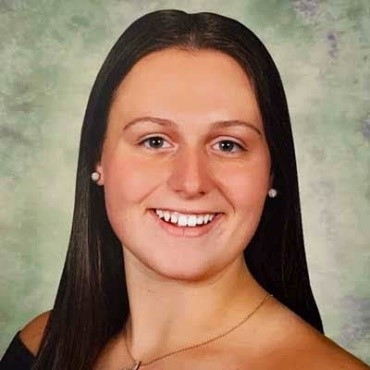 Even as a commuter student, Danielle Zito has found there are many ways to get involved on campus that enrich her experience at St. John’s University and prepare her for the future. Danielle is a legal studies major in the Collins College of Professional Studies. She was born and raised in Brooklyn and attended St. Edmund Preparatory High School, graduating with honors. The fall of 2020 found Danielle on the Queens campus the pandemic still going strong, but covid did not stop her from beginning her path toward becoming a lawyer.
Even as a commuter student, Danielle Zito has found there are many ways to get involved on campus that enrich her experience at St. John’s University and prepare her for the future. Danielle is a legal studies major in the Collins College of Professional Studies. She was born and raised in Brooklyn and attended St. Edmund Preparatory High School, graduating with honors. The fall of 2020 found Danielle on the Queens campus the pandemic still going strong, but covid did not stop her from beginning her path toward becoming a lawyer.
Danielle has wanted to be a lawyer since she was a little girl, and an internship during her sophomore year at St. John’s confirmed that the legal field was the perfect fit for her. This internship also directed her interest toward civil law as her area of practice in the future. Danielle’s immediate goal is to attend St. John’s Law School and then begin her career in the legal field, possibly as a wills and estates attorney.
One of Danielle’s most positive experiences at St. John’s has been the University Honors Program. She has discovered engaging professors, robust classroom discussions and debates, and many new friends in her honors classes. As importantly, the UHP has challenged her, making her a better student and critical thinker. The smaller class sizes have created a welcoming environment in which she feels comfortable engaging with classmates and professors on a more personal, non-judgmental level.
In addition to her participation in the UHP, Danielle is a member of Student Government, the Catholic Scholars Program, and the Legal Society. She also serves as Service Coordinator for the Saint Vincent DePaul Society and as a liturgical minister. In short, St. John’s has offered her many opportunities to prepare her for her career and deepens her Catholic faith while living out the Vincentian charism.
UHP News at St. John's
St. John's Professor interviewed by CNN about international visas
Dr. Niall Hegarty, Professor of Management at the Tobin College of Business, shares insight on international student visa restrictions.
Honors Programs Help St. John’s Students Excel
The University Honors Program at St. John’s University challenges high-achieving students while encouraging them to reach their highest academic potential.
Honors Student Sets Sights on 2028 Olympic Race Walking Team
While many of her fellow St. John’s University students took on jobs or internships, Ruby Ray, from Port Jefferson, NY, competed for a spot on the United States Olympic team.
